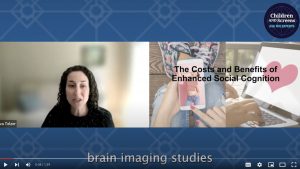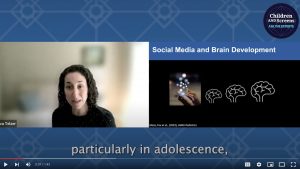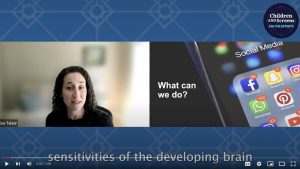
Eva Telzer, PhD (Co-Director, Winston National Center on Technology Use, Brain, and Psychological Development, Associate Professor of Psychology and Neuroscience, UNC Chapel Hill), discusses adolescent heightened social cognition and embarrasment, its relationship to brain development, and the effect online experiences can have on the adolescent brain at the #AskTheExperts webinar “The Social Brain on Screens” on April 11, 2023.
[Dr. Eva Telzer] I’m going to share a couple of results from some classic brain imaging studies that help us to understand the potential links between heightened social cognition and adolescence, as well as potential links to social media behaviors and downstream effects on their development. So this is a classic neuroimaging study by Leah Somerville, where they examined social processing. And when adolescents or children, all the way up through adulthood – this here is demonstrating age across childhood to adulthood. And we see that there are these peaks in adolescence in regards to medial prefrontal cortex activation. This is one of these brain regions of the social brain. There are peaks in brain activation as well as self-reported embarrassment when adolescents believe that they’re being observed by a peer. So adolescents, relative to children and adults, show greater MPFC activation and greater self-reported embarrassment. So just the mere idea that a peer is watching them is enough to increase their feelings of embarrassment and recruit brain regions involved in self-conscious processing. So just imagine what we might find if we examined more salient peer experiences online, like posting something self-relevant and waiting for peer feedback or getting rejected by peers online or other very meaningful social online experiences.
View the Full Webinar

The Social Brain on Screens
What are the functions of the social brain in childhood and what strategies can encourage healthy social development in youth?
Moriah Thomason, PhD
Barakett Associate Professor and Director of Pediatric Neuroimaging; Vice Chair for Research
Departments of Child and Adolescent Psychiatry and Population Health, New York University School of Medicine; Investigator, NYU Langone Neuroscience Institute
Eva Telzer, PhD
Co-Director; Associate Professor of Psychology and Neuroscience
Winston National Center on Technology Use, Brain, and Psychological Development; UNC Chapel Hill
Shimi Kang, MD, FRCPC
Psychiatrist; Best-selling author of The Tech Solution; Clinical Associate Professor
The University of British Columbia
Georgene Troseth, PhD
Professor of Psychology
Peabody College, Vanderbilt University





